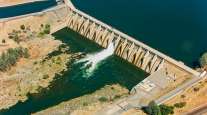Senior Reporter
Senate Highway Bill’s Freight Plan Touts Infrastructure Resiliency

[Stay on top of transportation news: Get TTNews in your inbox.]
Tucked into highway policy legislation that the Senate Environment and Public Works Committee recently advanced is a provision calling for possible strategies to prepare for the impact of severe weather events as part of a nationwide plan for improving freight connectivity.
Specifically, a strategy for weather-resilient infrastructure projects along the country’s freight corridors would entail having the ability to “anticipate, prepare for, or adapt to conditions, or withstand, respond to, or recover rapidly from disruptions, including extreme weather and natural disasters.”
Since the beginning of the year, Democrats on the transportation panels, such as committee ranking member Tom Carper (D-Del.), have called on colleagues to support provisions that would increase awareness about infrastructure resilience. They’ve pointed to severe flooding in the Midwest, and hurricanes in Texas, Florida, Puerto Rico and the U.S. Virgin Islands as examples of weather events that destroyed freight and commuter corridors.

Carper
Additionally, the legislation’s freight portion calls for an evaluation of states’ parking facilities and rest stops for commercial vehicles. The U.S. Department of Transportation also would be required to study the safe integration of freight into a “smart vehicle world.”
“Freight is [an] extremely important part of our objectives on an infrastructure reauthorization bill,” Sen. Ben Cardin (D-Md.) said during the committee’s consideration of the bill.
On July 30, the panel approved the five-year, $287 billion highway policy measure by a vote of 21-0. The bill would reauthorize provisions in the 2015 FAST Act highway law.
“The legislation will grow our economy, will create jobs and will improve the quality of life for the American people,” committee Chairman John Barrasso (R-Wyo.) said.
The bill also would establish the Promoting Resilient Operations for Transformative, Efficient, and Cost-saving Transportation, or PROTECT, grant program meant to assist states with projects geared toward enhancing weather-resilient infrastructure. This supplemental program would enable “communities to assess vulnerabilities to current and future weather events and natural disasters and changing conditions, including sea level rise, and plan infrastructure improvements and emergency response strategies to address those vulnerabilities,” according to the legislation.

Additionally, the bill proposes altering the composition of state freight advisory committees to consider representatives from ports, freight railroads, shippers, carriers, freight-related associations, third-party logistics providers, freight industry workforce, state transportation officials, metropolitan planning organizations, municipal officials, state environmental protection department officials, air resources board officials and economic development agencies.
Also proposed is the development of transportation corridors that would provide safe access for cars, trucks, cyclists and pedestrians. This “Complete Streets” concept would prioritize safety and “integrate active transportation facilities with public transportation service or improve access to public transportation.”
The Diesel Emissions Reduction Act would be reauthorized through 2024 under the legislation, as well. This federal program is designed to assist firms rebuild or retrofit diesel engines to comply with pollution standards. The program facilitates with “creating jobs and making communities safer places to live, work and raise a family,” EPW ranking member Carper said last month. The senator garnered bipartisan backing to help establish the program more than a decade ago.
Committees with jurisdiction over funding matters, commercial transportation and transit have yet to schedule legislative hearings on the reauthorization.
Groups, such as the American Association of Port Authorities, noted the bill’s freight policy proposals.
“AAPA greatly appreciates … recognizing the vital importance of increased investment in freight transportation, including port-related multimodal infrastructure,” AAPA president and CEO Kurt Nagle said. “This legislation is very promising for America’s seaports.”




